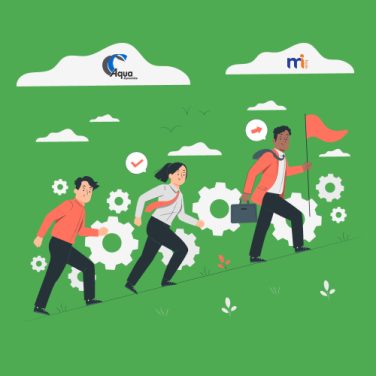
Hot on the heels of generative AI comes agentic AI, marking a breakthrough advancement in artificial intelligence as we know it.
So, what does agentic AI do? Simply put, it provides systems with the ability to act with a degree of autonomy and decision-making not seen before.
Unlike its predecessors, which rely heavily on pre-defined algorithms and constant human input, agentic AI can make independent decisions. These capabilities allow systems to plan, execute actions, and learn from experiences autonomously to achieve specific objectives set by humans.
By breaking down complex tasks into manageable steps, agentic AI leverages a ‘chaining’ capability that paves the way for efficient multi-step problem-solving, ultimately enhancing productivity across industries.
| Aspect | Traditional AI | Agentic AI |
|---|---|---|
| Decision-making | Rule-based and guided by specific algorithms | Autonomous, involves reasoning and experience learning |
| Human oversight | High level of human intervention required | Minimal intervention, yet oversight needed for critical tasks |
| Data handling | Limited to predefined datasets and tasks | Capable of handling diverse data sources autonomously |
Redefining the future
The fascinating and promising landscape of agentic AI is set to redefine the future of numerous industries.
Unlike conventional AI systems, agentic AI’s ability to function autonomously empowers strategic decision-making processes across various sectors. This autonomy in action is primarily attributed to agentic AI’s enhanced capacity for learning and adapting through experience.
- Unmatched autonomy: Agentic AI operates with minimal human intervention, which is crucial for industries that demand rapid decision-making and continuous adaptation based on dynamic data. This autonomy allows businesses to remain agile and responsive to market changes.
- Transformative potential: In the realm of HR, agentic AI revolutionises processes by automating candidate screenings and onboarding, significantly enhancing recruitment efficiency.
- Long-term benefits: The adoption of agentic AI technology promises sustained advantages such as improved productivity, efficient resource management, and better overall operational performance, ultimately leading to cost reductions and increased ROI.
By empowering decision-makers with intelligent insights and reducing reliance on manual processes, agentic AI is not only the future but a necessary evolution in today’s competitive business environment.
Data-driven HR strategies
With AI-driven HR analytics, businesses can engage in strategic planning and decision-making by turning vast amounts of HR data into actionable insights.
The integration of agentic AI allows for deeper analysis of employee demographics, performance metrics, and engagement levels, leading to more informed HR strategies.
This enables businesses to unlock employee potential and drive engagement through personalised learning paths and career development opportunities.
Incorporating agentic AI into HR processes not only streamlines operations but also enhances employee engagement by facilitating more personalised career guidance.
In the HR department, agentic AI supports professionals in making data-driven decisions, improving overall workforce management efficiency.
MiHCM solutions
MiHCM’s SmartInsights solution, for example, enables decision-makers to access powerful insights instantaneously – information that would traditionally take months to gather and analyse. It is designed as an integrated AI agent that instantaneously empowers the C-level management with critical information.
Meanwhile, SmartAssist, an AI-powered HR co-pilot developed by MiHCM as an additional layer atop its cloud HCM solution, offers a groundbreaking approach to enhance employee productivity.
MiA, MiHCM’s AI-powered personal workplace assistant, empowers employees, revolutionises management with AI-driven insights, and enhances productivity for businesses of all sizes.
Automation in HR processes
Agentic AI is revolutionising human resources by automating key tasks such as candidate screening and onboarding.
By harnessing sophisticated algorithms, these AI agents can efficiently sort through applications, schedule interviews, and streamline onboarding processes.
This not only reduces the administrative burden on HR teams but also accelerates the hiring cycle, fostering a seamless recruitment process.
With AI for candidate screening, SmartAssist streamlines candidate selection with a swift and comprehensive screening process based on predefined criteria.
Preparations for AI integration
As agentic AI continues to evolve, it promises to reshape multiple industries by autonomously executing complex tasks.
In preparing businesses to integrate agentic AI, organisations should focus on strategic planning and establishing robust frameworks that ensure transparency and accountability.
As the shift towards AI-driven operations intensifies, it is vital for businesses to adopt rigorous AI ethics and establish comprehensive oversight mechanisms. Collaboration between AI and human talents should be orchestrated in ways that both maximise AI’s potential and retain essential human oversight.
Furthermore, training existing workforces in AI literacy will be crucial to facilitate seamless collaboration between human workers and AI agents, ensuring that they can confidently manage and leverage these advanced technological tools.
Agentic AI stands at the forefront of technological innovation, ready to transform industries with its autonomous, intelligent capabilities.
Businesses must proactively embrace this technology, not only to boost operational efficiencies but also to remain competitive in an increasingly digital world.
Get in touch with MiHCM to learn more about the transformative potential of AI.
Our Microsoft-certified data science and AI experts can help you implement AI responsibly, unlock unprecedented potential, and build your business into a future-ready force.


